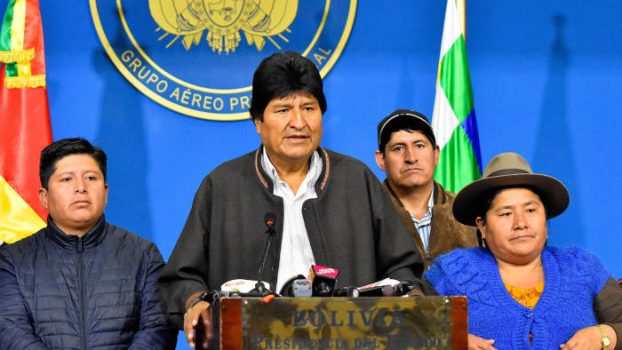 Bolivian President, Evo Morales has resigned after nearly 14 years in power amid protests following his disputed re-election last month.
Bolivian President, Evo Morales has resigned after nearly 14 years in power amid protests following his disputed re-election last month.
The head of the army had called on him to go after protests over his election victory. This is even as auditors found irregularities with the poll but Mr. Morales said he had been the victim of a coup.
The country’s Army chief, Gen Williams Kaliman urged Mr. Morales to resign ‘to allow for pacification and the maintaining of stability’, adding that it would conduct operations to neutralize any armed groups which attacked the protesters.
In a televised address on Monday, Mr. Morales said he was leaving to help protect families of political allies after their homes were burned down, urging the protesters to stop attacking their brothers and sisters.
Although the biggest criticism of Morales was his lack of respect for Bolivia’s democracy by overstaying his welcome and refusing to step down, the fact that the military called the shots before his resignation does not do much for the country’s democracy either.
However, a power vacuum has been created following Morales’ resignation as Vice-President Alvaro García and the country’s Senate President, Adriana Salvatierra also resigned.
The priority now is to choose an interim leader, call new elections and bring a polarized Bolivia together or face yet more unrest and violence in the coming weeks.
Tensions first flared on the night of the presidential election after the results count was inexplicably stopped for 24 hours. The final result gave Mr. Morales slightly more than the 10 percentage point lead he needed to win outright in the first round of the race.
At least three people died during clashes which followed the declaration of the results of the poll. Some uniformed police officers also joined the protesters.
On Sunday, the Organization of American States, which monitored the elections said it had found evidence of wide-scale data manipulation and therefore could not certify the result of the previous polls.
Pressure continued to build on Mr. Morales as the days went by as several of his political allies resigned, some citing fears for the safety of their families.
Opposition leader, Carlos Mesa who came second in last month’s poll took to Twitter to thank the protesters for the heroism of peaceful resistance, describing the development as the end of tyranny.
The Cuban and Venezuelan leaders who had previously voiced their support for Mr. Morales condemned the events as a coup.
Cuban President, Miguel Díaz-Canel described it as a violent and cowardly attempt against democracy while Venezuelan leader, Nicolas Maduro tweeted: “We categorically condemn the coup realized against our brother president.”
Morales, Bolivia’s first indigenous president since 2006 ran for a fourth consecutive term in the October elections after a controversial decision by the constitutional court to scrap presidential term limits.
In a 2016 referendum, a majority had voted ‘no’ to dropping the limit of term numbers which Bolivian presidents could serve but the ruling party took the matter to the constitutional court which abolished the term limits altogether.

Biden Administration Imposes New Sanctions On Iran Following Attack On Israel
Israel’s European Allies Urge Restraint Amid Escalating Tensions With Iran
Israel Prepares For Possible Attack From Iran As Tensions Escalate
Senegal’s President Bassirou Appoints Ousmane Sonko As New Prime Minister